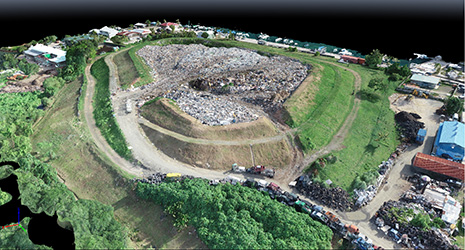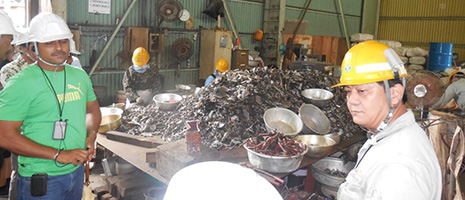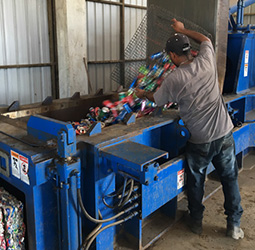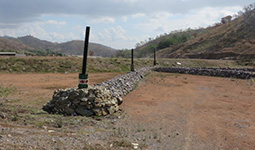INDEX
- English
- 日本語

3D-image of the M-Dock landfill site in Palau produced from a drone photo - English
- 日本語

A waste management training course for Pacific islands-based experts in Okinawa, Japan

Aluminum cans collected through CDL in the Marshall Islands 
The Baruni Dump Site in the Independent State of Papua New Guinea where the Fukuoka Method is used
August 2020
Protecting the Pacific Islands from Waste

The waste problem in Pacific island countries in Oceania is becoming ever more serious. Japan has been supporting these islands for many years through activities to improve waste management.

Oceania, an area of the Pacific Ocean dotted by many small and large islands, is a region bursting with beautiful nature and diverse cultures. However, in recent years, the type of waste has diversified and the amount of waste has continued to increase in Pacific island countries due to an increase in populations and changes in residents’ lifestyles, such as the popularization of plastic bags and bottles. The growth of tourism has exacerbated the problem of waste disposal. The waste is transported to landfills, but securing new disposal sites is difficult for these small island countries. How to process the increasing amount of waste has become a major common problem for these countries.
The Japan International Cooperation Agency (JICA) has been implementing initiatives to solve the waste problem for approximately twenty years in Pacific island countries. One of these initiatives is the support for disposal site improvements. In Pacific island countries, open dumping, where collected waste is simply thrown into disposal sites without separating waste by type, was common. However, by this disposal method, problems emerged with an increase in waste, such as the occurrence of foul smells and methane gas, and the leakage of contaminated water (leachate) from waste into rivers and the ocean. JICA has been working on spreading the technology of the Semi-aerobic Landfill System, a method for managing waste that has been widely implemented in Japan. These landfills, which employ a technology known as the “Fukuoka Method” as it was jointly developed in the 1970s by the city of Fukuoka and Fukuoka University in Japan, have pipes throughout the disposal site, and through those pipes, waste water that seeps out from waste can be extracted. At the same time, outside air can be introduced into the landfill, activating the microorganisms inside the waste and promoting its decomposition.
Nakamaru Shunsuke from Global Environment Department, JICA says, “The Fukuoka Method can reduce the occurrence of foul smells and methane gas, and improve the quality of leachate through the acceleration of decomposition of waste. Moreover, by improving the structure of disposal sites and conducting the appropriate management, the lifespan of the disposal site is extended. Also, materials that can be obtained locally, such as oil drums or old tires, are used for the pipes, and the fact that they can be constructed and maintained at a relatively low cost is a big advantage.”

Since introducing a Fukuoka Method disposal site in 2003 in the Independent State of Samoa as the first in a Pacific island country, this type of disposal site has spread to other countries including the Republic of Vanuatu and the Republic of Palau.
Furthermore, JICA has been implementing the technical cooperation project “Promotion of Regional Initiative on Solid Waste Management in Pacific Island Countries” (J-PRISM) since 2011 (Phase 2 ongoing from 2017) in cooperation with the Secretariat of the Pacific Regional Environment Programme (SPREP), a regional international organization participated in by twenty-two countries and regions in Oceania. J-PRISM fosters human resources, and creates and strengthens systems to solve the waste problem. Based on geographical characteristics unique to island countries and the concept of “3R (reduce, reuse and recycle) + return,” which aims to control inflow of products to the island countries, increase recycling in the island countries as much as possible, and maximize the return of waste to recycling markets outside the island countries, J-PRISM is working to minimize the amount of final waste disposal. For example, as part of the fostering of human resources, J-PRISM carries out training in Japan and the island countries for administrative officers of waste management and employees of recycling companies of each country to learn about waste management systems and initiatives for the 3Rs in the communities. The capacity of waste management of each country is thus improved by sharing good practices and the lessons between counterparts in each country.
J-PRISM also supports the introduction of Container Deposit Legislation (CDL), where a deposit is paid by consumers when buying drinks and other goods in cans and plastic bottles, and then a part of the deposit is returned to consumers or waste collection companies when the used containers are brought to a designated place. CDL was implemented in the Republic of the Marshall Islands (population: approx. 58,000) in 2018, following its introduction in the Republic of Kiribati, the Federated States of Micronesia and the Republic of Palau. Many people including children and adults participated, and approximately 16 million cans, glass bottles and plastic bottles were collected in the span of a year in 2019.
Drones have also been used for the project lately to take surveys of disposal sites for analysis. Previously, a site could only be observed from the ground, and it was difficult to grasp the complete picture of the site. But with aerial photography, it has become possible to visualize the current state of a site and to more accurately analyze how many more years a site can be used for.

Nakamaru says, “I’m glad that the cooperation with Japan over about twenty years has contributed to the development of human resources for waste management and the improvement in people’s awareness. Lately, a database of human resources working for the waste management in each Pacific island country has been developed by J-PRISM, so I’m sure that cooperation between countries will further progress as well.”
Japan’s cooperation is connecting islands scattered across the ocean.

